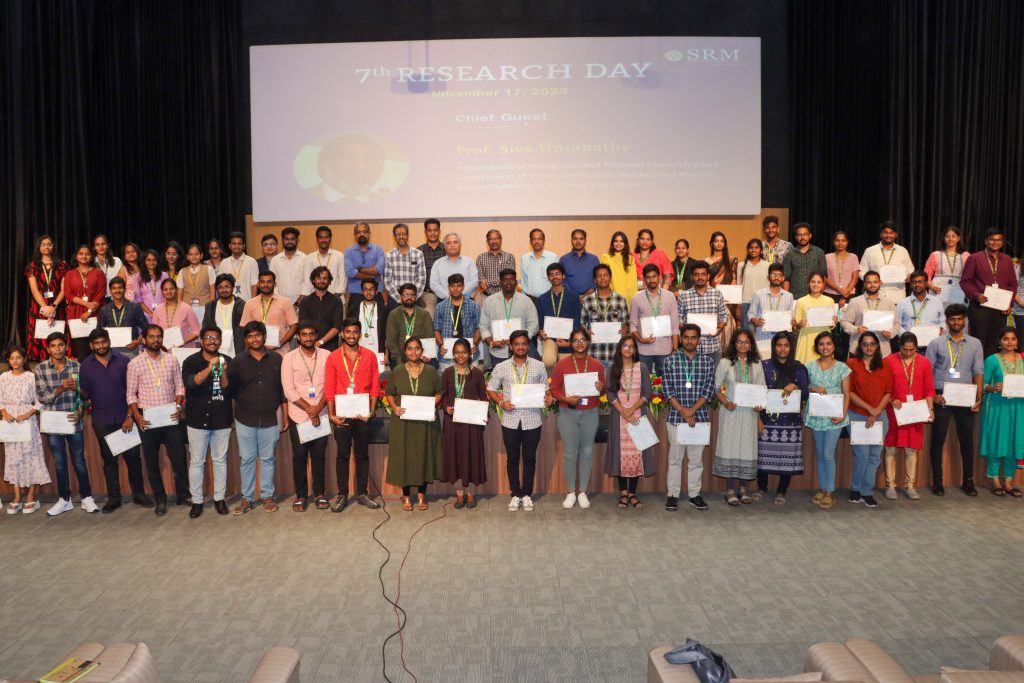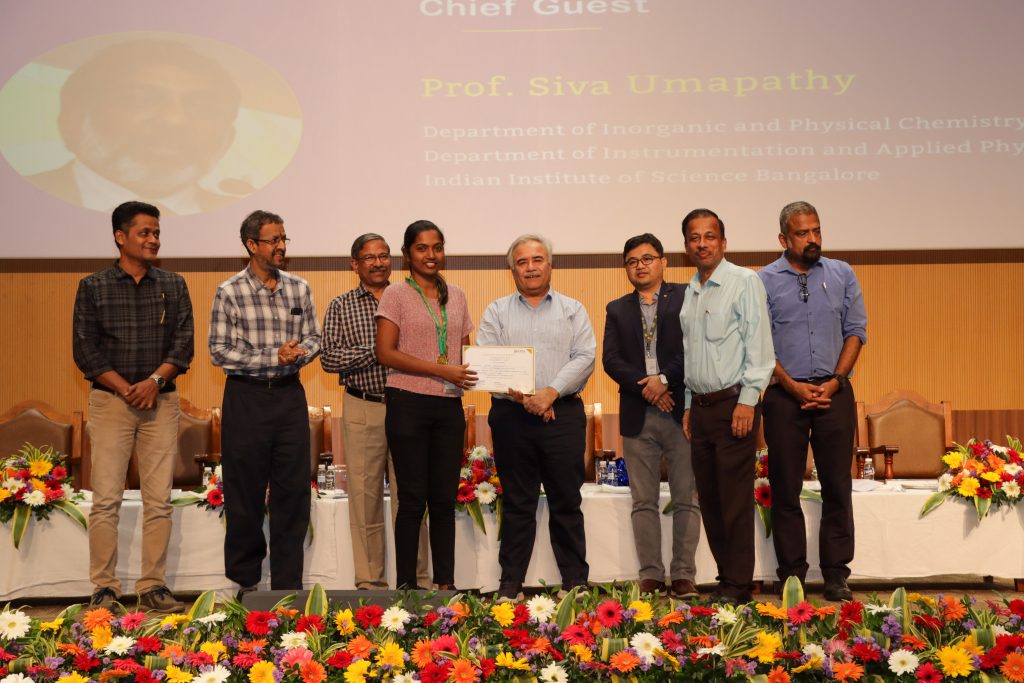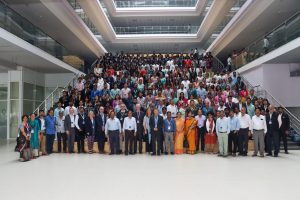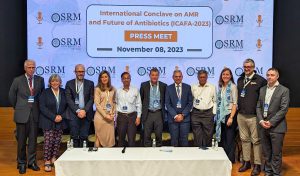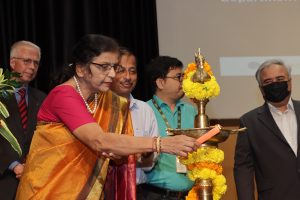Using Nonlinear Differential Equations to Formulate a Novel Approach to Combat HIV-1
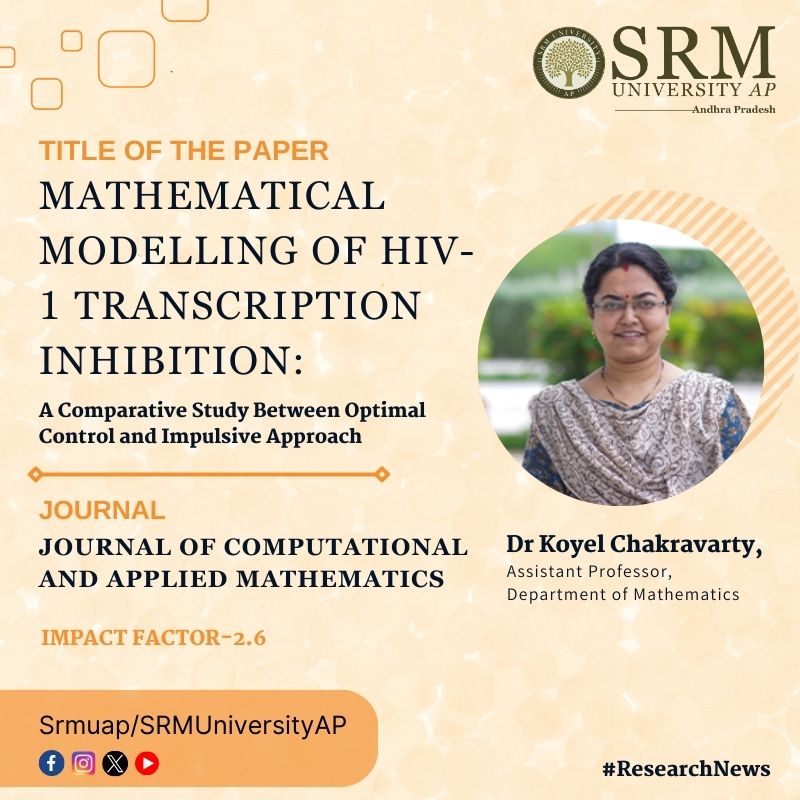
The combat against HIV, the virus responsible for AIDS has witnessed consistent advancements and studies put forward by researchers in various fields. To identify a more intelligent and effective approach to combat HIV-1 and enhance the understanding of the workings of its treatments, Dr Koyel Chakravarty, Assistant Professor, Department of Mathematics has published a paper titled “Mathematical modelling of HIV-1 transcription inhibition: a comparative study between optimal control and impulsive approach” in the Q2 journal, Journal of Computational and Applied Mathematics.
Abstract
By adopting a proactive strategy, this study facilitates the interaction with human immunodeficiency virus type I (HIV-1), successfully navigating its sequential fusion stages. This approach enables efficient infiltration of the virus into a target CD4+T helper cell within the host organism, initiating the virus’s replication cycle. As a retrovirus, HIV-1 orchestrates the conversion of its single-stranded viral RNA genome into a more stable double-stranded DNA structure. The newly formed DNA integrates with the host cell’s genetic material, and the pro-viral DNA transforms into functional messenger RNA (mRNA) with the assistance of the host enzyme RNA polymerase II (Pol II).
The ongoing research focuses on constructing a meticulous mathematical framework using a system of nonlinear differential equations. The investigation aims to assess the impact of a Tat inhibitor on suppressing the transcriptional activity of HIV-1, treating it as an optimal control problem. The study also evaluates the Tat inhibitor’s efficacy as a potential therapeutic intervention for HIV-1 infection. Employing a one-dimensional impulsive differential equation model to determine the mathematically derived maximum concentration of the elongating complex (P2), the research considers the crucial aspect of optimal timing between successive dosages. A comparative analysis contrasts the effects of continuous dosing with impulse dosing of the Tat inhibitor, using numerical analysis to evaluate outcomes. The findings underscore the superior effectiveness of impulsive dosing over continuous dosing in inhibiting HIV-1 transcription. Visual representations of the model’s parameter sensitivities enhance understanding of the intricate physiological and biochemical processes within the system.
Practical implementation/social implications of the research
1. Treatment Optimization:
• Practical Implementation: Develop personalized treatment plans for individuals with HIV-1 based on the optimal control and impulsive approaches identified in the study.
• Social Implication: Improve the effectiveness of HIV-1 treatments, potentially leading to better health outcomes and a higher quality of life for individuals living with the virus.
2. Drug Administration Guidelines:
• Practical Implementation: Provide guidelines for healthcare professionals on the timing and dosage of Tat inhibitors using insights from the comparative study.
• Social Implication: Enhance the efficiency of drug administration, potentially reducing side effects and improving patient adherence to treatment regimens.
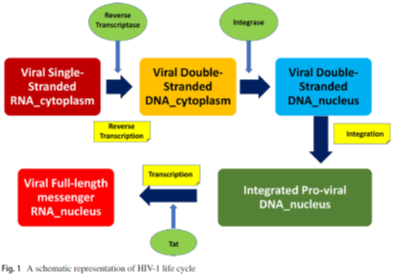
3. Public Health Planning:
• Practical Implementation: Incorporate the study’s findings into public health planning, considering the optimal and impulsive control strategies in broader HIV-1 prevention and treatment programs.
• Social Implication: Contribute to more effective and resource-efficient public health interventions, potentially reducing the overall burden of HIV-1 in communities.
4. Drug Development Strategies:
• Practical Implementation: Inform pharmaceutical companies and researchers about the comparative study results to guide the development of new HIV-1 inhibitors or improvements to existing drugs.
• Social Implication: Accelerate the development of more potent and targeted therapies, offering new options for managing HIV-1 infections.
5. Patient Education:
• Practical Implementation: Develop educational materials for individuals with HIV-1, explaining the importance of adherence to optimized treatment plans based on the study’s findings.
• Social Implication: Empower patients to actively participate in their treatment, potentially leading to better treatment outcomes and reduced transmission rates.
6. Policy Recommendations:
• Practical Implementation: Present policy recommendations to healthcare institutions and government agencies based on the study’s outcomes.
• Social Implication: Influence health policies to integrate the most effective strategies for HIV-1 transcription inhibition, potentially contributing to more efficient resource allocation and improved public health outcomes.
7. Global Health Impact:
• Practical Implementation: Collaborate with international health organizations to disseminate the study’s findings globally.
• Social Implication: Contribute to global efforts in controlling the HIV-1 pandemic, fostering collaboration and knowledge-sharing among nations.
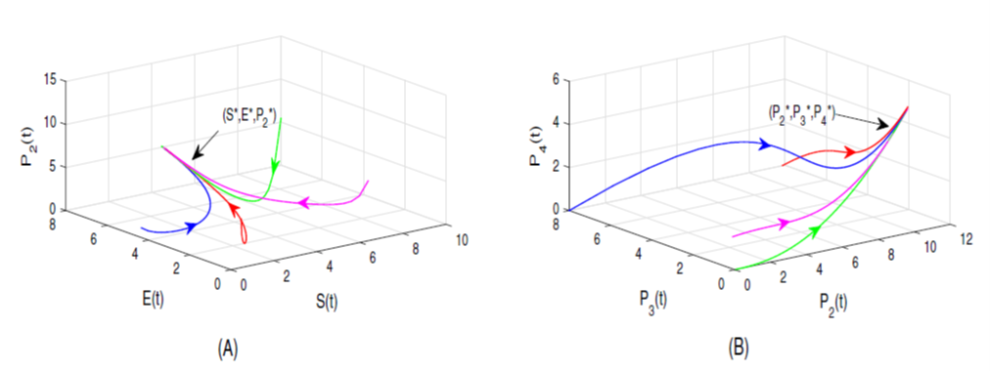
8. Reduced Healthcare Costs:
• Practical Implementation: If the impulsive approach proves more cost-effective, healthcare systems can implement this strategy to potentially reduce the overall cost of HIV-1 treatment
• Social Implication: Alleviate financial burdens on both individuals and healthcare systems, making HIV-1 treatment more accessible
In summary, the practical implementation and social implications of this study extend from optimizing individual treatment plans to influencing global health policies, ultimately contributing to more effective HIV-1 management and improved public health outcomes.
Collaborations
- Prof. D C Dalal, Professor, Department of Mathematics, IIT Guwahati
- Prof. A K Sarkar, Professor, Centre for Mathematical Biology and Ecology, Department of Mathematics, Jadavpur University
- Dr L N Guin, Associate Professor, Department of Mathematics, Visva-Bharati
Future Prospects of the Research
- Mathematical Modelling of Cholesterol Dynamics.
- Mathematical Modelling of Muscle Regeneration.
- Mathematical Modelling of Bone Remodelling
- Mathematical Modelling of Glucose-Insulin Dynamics.
- Mathematical Modelling on HIV-1 Transcription.
- Mathematical Modelling of Population Dynamics for Patients suffering from Diabetes.
- Published in Departmental News, Math News, News, Research News
Intellectual realm of Vaishnava Philosophy and Poetic Aesthetics
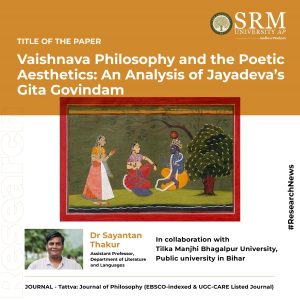 Dr Sayantan Thakur, Assistant Professor in the Department of Literature & Languages have published his research paper, ‘Vaishnava Philosophy and the Poetic Aesthetics: An Analysis of Jayadeva’s Gita Govindam‘ in Tattva: Journal of Philosophy, an esteemed EBSCO-indexed and UGC-CARE Listed Journal. Dr Thakur’s work embodies the spirit of academic rigor and philosophical inquiry. Join us in traversing the landscapes of wisdom, where intellect meets aesthetics, and knowledge transcends boundaries. Explore the rich tapestry of ideas that define SRM University-AP‘s commitment to intellectual excellence.
Dr Sayantan Thakur, Assistant Professor in the Department of Literature & Languages have published his research paper, ‘Vaishnava Philosophy and the Poetic Aesthetics: An Analysis of Jayadeva’s Gita Govindam‘ in Tattva: Journal of Philosophy, an esteemed EBSCO-indexed and UGC-CARE Listed Journal. Dr Thakur’s work embodies the spirit of academic rigor and philosophical inquiry. Join us in traversing the landscapes of wisdom, where intellect meets aesthetics, and knowledge transcends boundaries. Explore the rich tapestry of ideas that define SRM University-AP‘s commitment to intellectual excellence.
Abstract
Literature finds the best expression when literary aesthetics and philosophy run side by side. The former offers the external charm, while the latter inculcates the more profound implication with the aim of providing it with a superior stature and permanence. Jayadeva’s Gitagovindam, being a colossal work in the field of Vaishnava literature, does contain the brilliant juxtaposition of both. This article attempts to show how Jayadeva’s Gitagovindam, a colossal work in the field of Vaishnava literature, does contain the brilliant juxtaposition of both. On the one hand, like a typical lyrical poem, its melodic nature does have a soothing effect and on the other, the use of philosophy instils in it a greater depth and seriousness to uplift itself as a book of devotion and religious inspiration. Moreover, the importance of this Holy Scripture lies in the fact that it not only played a significant role in paving the way to form a new sect in the Vaishnava religion, known as ‘Gaudiya Vaishnavism’, but also showed the later Vaishnava lyricists the art of portraying in words the amorous love of Lord Krishna and Radha with compassion and tears.
Practical implementation and social implications of the research
Cultural Preservation: Understanding and analysing ancient texts like the Gitagovindam helps in preserving cultural and religious heritage. This research can contribute to the preservation and understanding of Vaishnava philosophy and its cultural significance.
Literary Understanding: Analysis of the text can provide insights into the interplay between philosophy and aesthetics in literature. It can be used as a tool for students, scholars, and enthusiasts to comprehend how profound thoughts are conveyed through art and literature.
Religious Studies: It will be valuable for religious scholars and practitioners, shedding light on the philosophical underpinnings of Vaishnavism. It can deepen the understanding of the religious sentiments associated with the worship of Lord Krishna.
Artistic Inspiration: By examining the poetic aesthetics the research might inspire contemporary artists, poets, and musicians in exploring similar thematic elements in their creations. It could lead to the creation of new artistic works that incorporate similar philosophical depth.
Community Understanding: Studies like mine can also bridge gaps in understanding between different communities by shedding light on the beliefs and values encapsulated in ancient texts. This understanding might foster better cultural appreciation and harmony.
Interdisciplinary Insights: The analysis might encourage interdisciplinary studies by merging literary analysis with philosophy, offering new avenues for exploration and collaboration between these fields.
Collaborations
Dr. Uday Kumar Mishra, Professor, Department of English, TMBU
Future Research Plans
- Regional Literature in Translation
- Tantric Tradition and Eastern Indian Literature,
- Folk Music of Bengal,
- Indian Philosophy, Aesthetics & Literature
Link to the Article
https://journals.christuniversity.in/index.php/tattva/article/view/3640/2480
- Published in Departmental News, English Current Happenings, News, Research News
A Novel IRS-relay Network for ITS with Nakagami-m Fading Channels
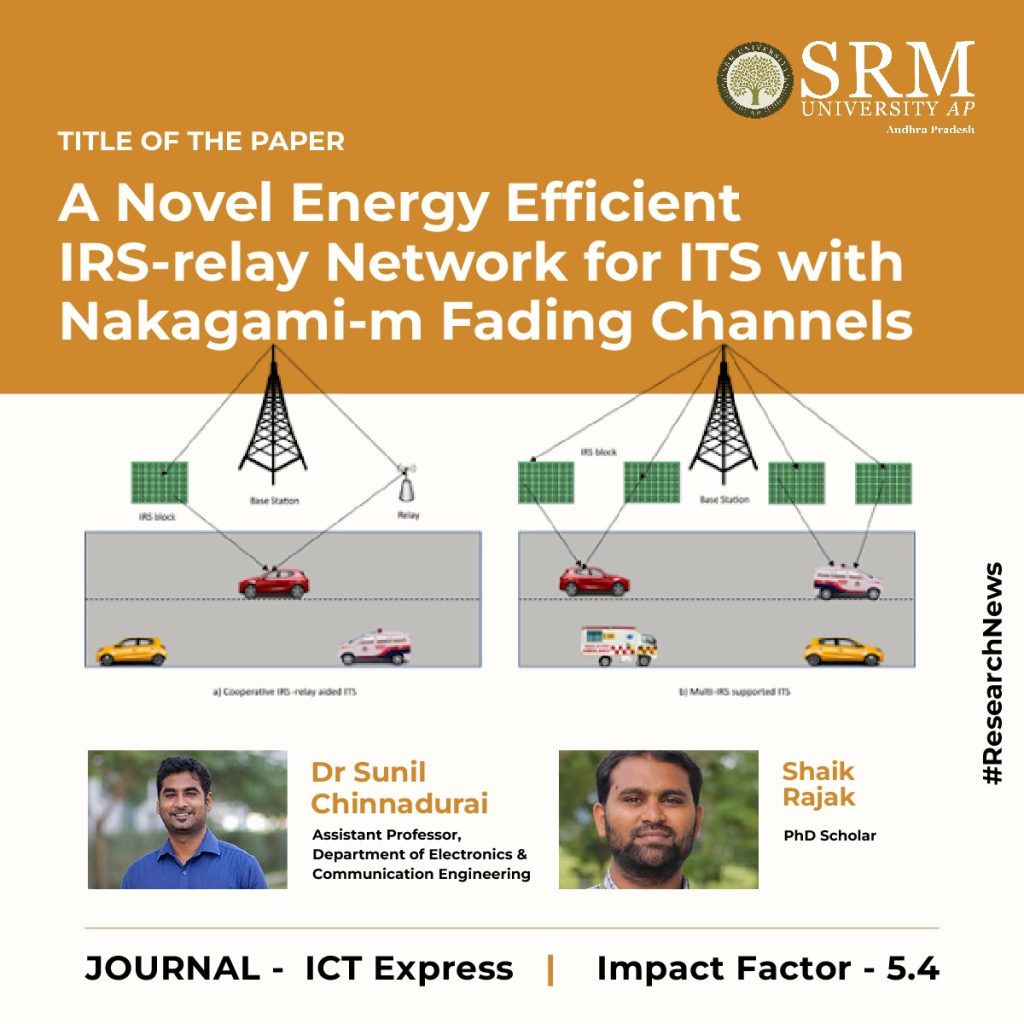
The Department of Electronics and Communication Engineering is proud to announce the publication of a research paper by Dr Sunil Chinnadurai, Assistant Professor and Research scholar Shaik Rajak titled “Novel Energy Efficient IRS-relay Network for ITS with Nakagami-m Fading Channels” in the Q1 journal ICT Express, having an Impact Factor of 5.4. The paper focused on developing an energy-efficient network for ITS that utilises Nakagami-m fading channels to improve communication reliability and efficiency.
In this work, the research duo introduced a cooperative system involving relay technology and an IRS (Intelligent Reflective Surface) with passive elements. Evaluating energy efficiency and achievable rates, they found that the cooperative relay-IRS system outperformed individual relay and IRS setups. The study also compared multi-IRS setups, highlighting their effectiveness in reducing power consumption and deployment costs for improved ITS development.
Abstract
The research paper investigates the performance of energy efficiency (EE) for Intelligent Transportation Systems (ITS) using a cooperative IRS-relay network. The proposed cooperative IRS-relay-aided ITS network integrates an IRS block with a number of passive reflective elements to improve EE. The research analyses the ITS in terms of EE and achievable rate under Nakagami-m fading channel conditions. The research aims to reduce power consumption over long distances and operate the system faster and safer.
Practical implementation/ social implications of the research
The proposed cooperative IRS-relay network for Intelligent Transportation Systems (ITS) has practical implications for improving energy efficiency and achieving higher data rates in ITS networks. Integrating an IRS block with passive reflective elements in the relay model enhances the coverage area and reduces power consumption in ITS. The research highlights the significance of cooperative IRS-relay and multi-IRS-aided networks in the development of ITS, which can contribute to safer and faster transportation.

Dr Chinnadurai and Mr Rajak Future will continue to work on their research focusing on optimizing the design of the cooperative IRS-relay network for ITS to improve energy efficiency and achievable data rates further in real-world scenarios.
- Published in Departmental News, ECE NEWS, News, Research News
Physics Duo Publish in Prestigious Journal
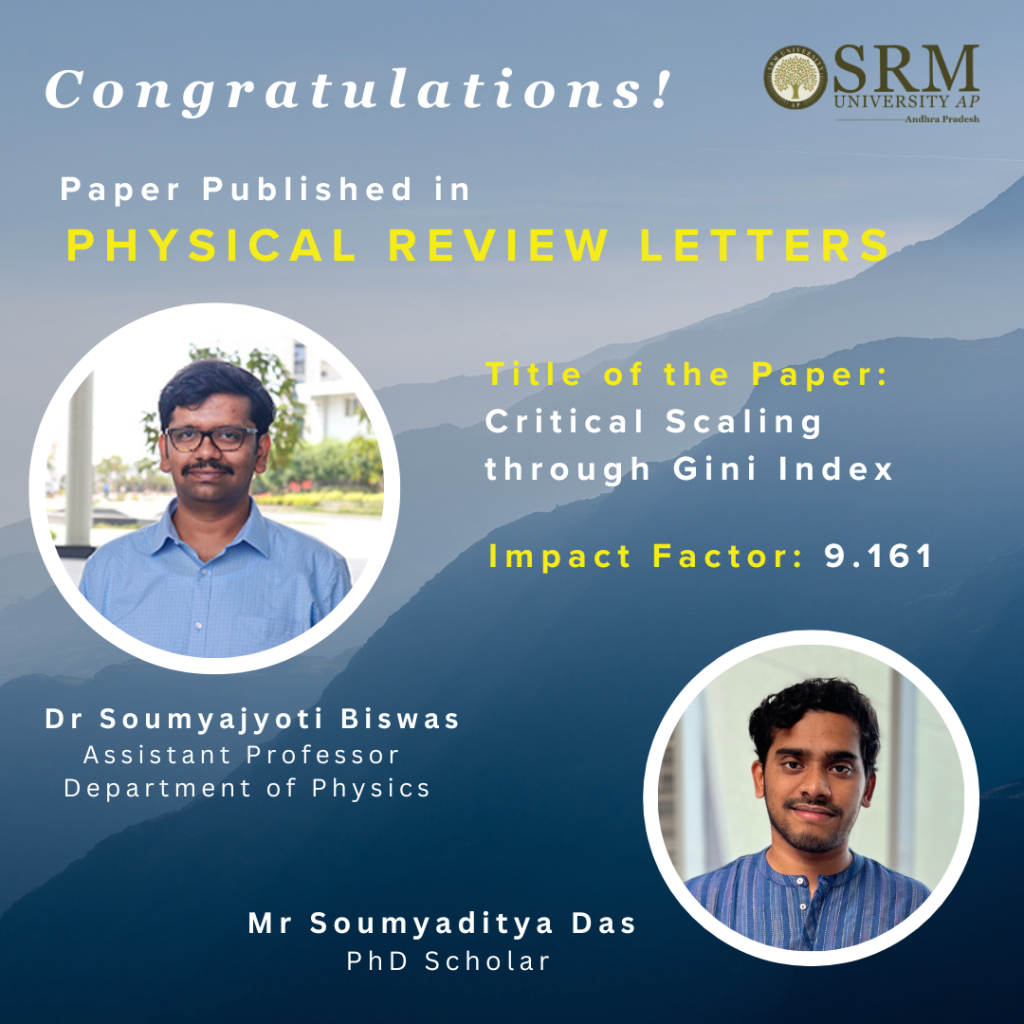
Dr Soumyajyoti Biswas, Assistant Professor in the Department of Physics, along with his Doctoral Scholar, Mr Soumyaditya Das, have presented groundbreaking findings through their research work titled “Critical Scaling through Gini Index”. The research paper was featured in the prestigious Physical Review Letters, which has an impact factor of 9.161.
Abstract
In the systems showing critical behaviour, various response functions have a singularity at the critical point. Therefore, as the driving field is tuned toward its critical value, the response functions change drastically, typically diverging with universal critical exponents. In this Letter, we quantify the inequality of response functions with measures traditionally used in economics, namely by constructing a Lorenz curve and calculating the corresponding Gini index. The scaling of such a response function, when written in terms of the Gini index, shows singularity at a point that is at least as universal as the corresponding critical exponent. The critical scaling, therefore, becomes a single parameter fit, which is a considerable simplification from the usual form where the critical point and critical exponents are independent. We also show that another measure of inequality, the Kolkata index, crosses the Gini index at a point just prior to the critical point. Therefore, monitoring these two inequality indices for a system where the critical point is not known can produce a precursory signal for imminent criticality. This could be useful in many systems, including condensed matter, bio- and geophysics to atmospheric physics. The generality and numerical validity of the calculations are shown with the Monte Carlo simulations of the two-dimensional Ising model, site percolation on the square lattice, and the fibre bundle model of fracture.

Fig.1: Shows the crossing point of the Gini index and the Kolkata index prior to critical point for three different models (from left Ising model in 2d, site percolation in 2d and fiber bundle model of fracture) form both side of critical point.
Collaborations and Future Plans
This work essentially builds a framework for indicating imminent critical points for any system. Therefore, in situations where such knowledge is vital, for example, in the fracture of solids, the method is going to be highly useful in forecasting the failure point. We are in the process of working with our collaborators at the University of Barcelona to experimentally verifying our methods for the compressive failure of porous samples. This is a significant first step towards opening new pathways in forecasting fracture points in disordered materials that could have an impact on laboratory-scale fractures to large constructions and eventually to earthquakes.
We wish the teacher-student duo many more fulfilling and enriching research endeavours in future!
- Published in Departmental News, News, Physics News, Research News
Utilising Social Media Platforms for Crisis Management
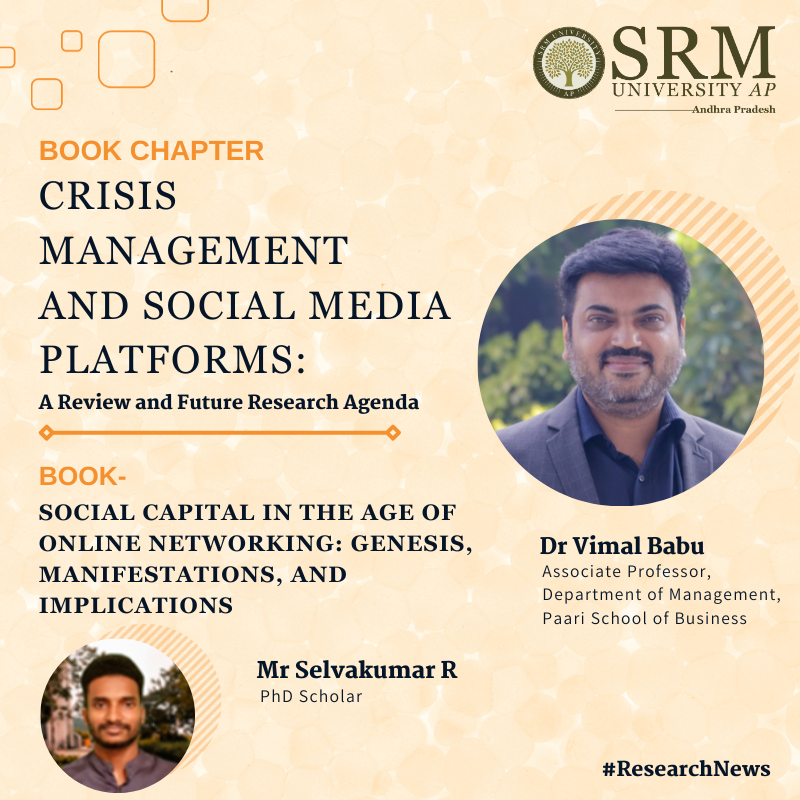
Dr Vimal Babu, Associate Professor and Mr Selvakumar R, Research Scholar from the Department of Management, Paari School of Business has published a fascinating book chapter titled “Crisis Management and Social Media Platforms: A Review and Future Research Agenda” in the book Social Capital in the Age of Online Networking: Genesis, Manifestations, and Implications examining their perspectives on the ever-changing digital ecosystem and its repercussions.
In this chapter, we research duo has made a concerted effort to advance the understanding of crisis management using social media platforms (Social networking sites). Crisis management encompasses a broader spectrum of crisis leadership, and utilising social media platforms (SMPs) for crisis management (CM) has become the modern approach to handling crisis events. Recognising the importance of exploring and advancing crisis leadership concepts to enhance the existing body of knowledge, his work is the first to employ a bibliometric approach to investigate this area, contributing to the nascent literature on the subject. The unique insights garnered from this analysis are expected to provide valuable guidance to researchers and scholars interested in this emerging field.
The book “Social Capital in the Age of Online Networking” digs into the fascinating growth of relationships and connections in the virtual sphere in a digital era when clicks matter as much as handshakes. This edited volume reveals the pattern of our modern networked society, linking theoretical ideas and real-world implementations. The book’s objective is to provide a comprehensive understanding of the current and prospective state of theory and applications of this phenomenon, and it will benefit researchers, government and private research institutions, business corporations, and students in various fields such as business, economics, information technology, psychology, medicine, and humanities.
- Published in Departmental News, News, Paari Current Happenings, Research News
Exploring the Dynamics of Democracy and Foreign Policy
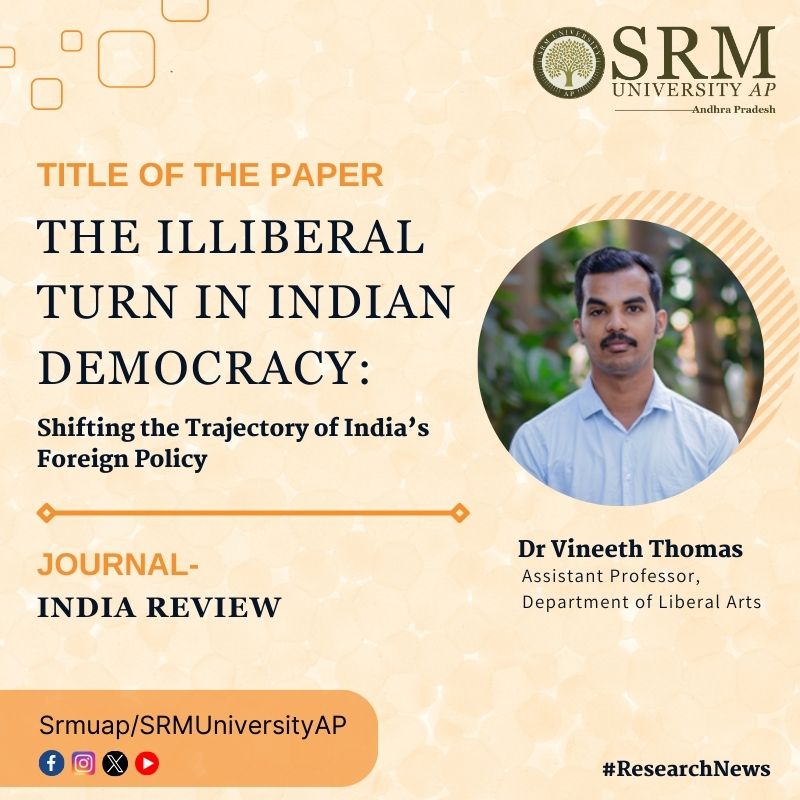
Dive into the intricate realms of Indian democracy and its ever-evolving foreign policy with a compelling research paper by Dr Vineeth Thomas, Assistant Professor, Department of Liberal Arts. The university is happy to announce the publication of Dr Thomas’ latest work, titled “The Illiberal Turn in Indian Democracy: Shifting the Trajectory of India’s Foreign Policy“, in the prestigious Q2 Journal “India Review“.
The paper is a profound exploration of the dynamic shifts in India’s foreign policy, drawing attention to the complexities of the nation’s democratic journey. His research delves into the nuanced interplay of domestic politics and global diplomacy, providing fresh perspectives on the illiberal turn in India’s democratic trajectory. The insightful work takes on a thought-provoking journey into the evolving facets of Indian democracy and the intricate interplay between domestic politics and foreign policy.
Abstract
Long-standing democracies such as India were not exempt from the global trend of democratic retreat. India has come under increasing international attention due to certain domestic policies such as the revocation of Article 370 of the Indian Constitution, the National Register of Citizens and Citizenship (Amendment) Act passed under the Bharatiya Janata Party government. In addition to India’s democratic decline being reflected in global democratic rankings, this has induced strains on India’s foreign relations. In its pursuit of becoming a leading power, India’s perceived democratic backsliding is likely to influence the direction of its foreign policy. To discern the impact of its perceived illiberal turn on its foreign engagement, the role of democracy in India’s foreign policy needs to be explored. While attempts have been made to understand democratic backsliding through a theoretical lens, the impact of a nation’s democratic status on its foreign relations and policy remains a largely unexplored area.
This study will help to understand how India’s democratic backsliding can induce a shift in its foreign policy.
- Published in Departmental News, Liberal Arts News, News, Research News
“A Celebration of Research”: 7th Research Day at SRM University-AP
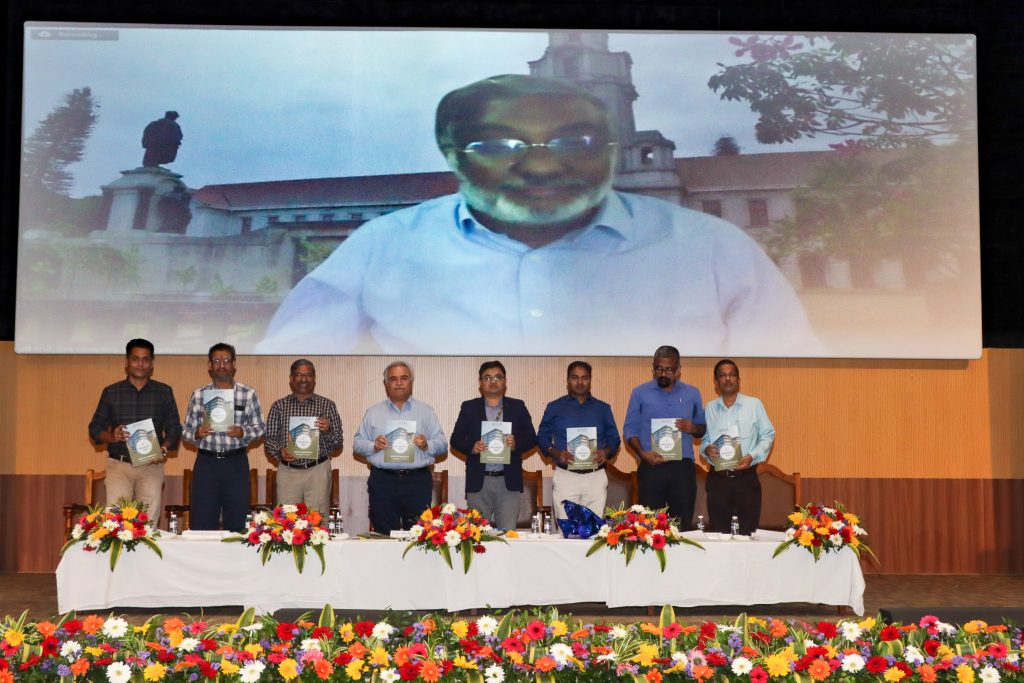
“Motivating young potential minds to pursue research and nurture a scientific career defines the true meaning of research”, said Prof. Siva Umapathy, Senior Professor at the Department of Inorganic and Physical Chemistry, Indian Institute of Sciences, Bengaluru, in his distinguished speech as the chief guest for Research Day at SRM University-AP.
The varsity celebrated the 7th Research Day on November 17, 2023, in the august presence of Prof. Siva Umapathy, Chief Guest (virtual mode), Prof. Manoj K Arora, Vice Chancellor; Dr R Premkumar, Registrar; Prof. Ranjit Thapa, Dean Research; Deans and Associate Deans of SRM University-AP. Faculty, scholars, students and researchers graced the event commemorating research excellence by young potential minds. Prof. Umapathy emphasised the significance of research in undergraduate studies in his address by stating that, “True advancement in research occurs when you gain depth in your area of study and utilise the knowledge to pursue innovation”.
Prof. Ranjit Thapa remarked that research is an essential pillar of the university that has contributed to the university’s growth as a world-class research-intensive institute. He highlighted that with 1760+ journal publications with 50% in Q1 journals, 41 Nature Index publications, 155 patents published and 10 granted, industry and research projects with an outlay of 29+ crores, 50+ research laboratories, 300+ research scholars, the university has achieved unprecedented success in the research frontier within a span of 6 years. The Deans of all schools also presented a brief report on the research activities and significant achievements of their faculty at the event.
Vice Chancellor, Prof. Manoj K Arora lauded the university’s mission to provide research- centric education for its students. “At SRM University-AP, we encourage cutting-edge translational research and provide financial and technical support for students to rise to the global frontiers of breakthrough research. The university offers expert faculty, top-notch facilities and a research-driven curriculum designed to build a thriving innovative ecosystem”, remarked Prof. Arora.
A paper presentation contest was held as part of the Research Day. 200+ abstracts in the undergraduate/postgraduate category and 80+ abstracts in the PhD category were received from young researchers in various areas of research ranging from AI/ML to Environment and Sustainability, from Literature, Linguistics, Culture & Gender to Nanotechnology and Physical Sciences. Winners of the paper presentations were awarded with Gold and Silver medals with special mention of appreciation for their guides and mentors. The unveiling of the Abstract Book, with over 300 abstracts received from the participating researchers, was a highlight of the event.
Chief Guest, Prof. Siva Umapathy was virtually honoured with a memento as a token of appreciation by the dignitaries. Dr R Premkumar delivered the vote of thanks expressing his sincere gratitude towards the chief guest and the convenors of the Research Day. SRM University-AP hosted the 7th Research Day with great fervour to maintain the spirit of research among young students and nurture an innovative and conducive research ecosystem.
- Published in News, Research News
Secularity Unveiled: A Critical Analysis by Prof. Vishnupad
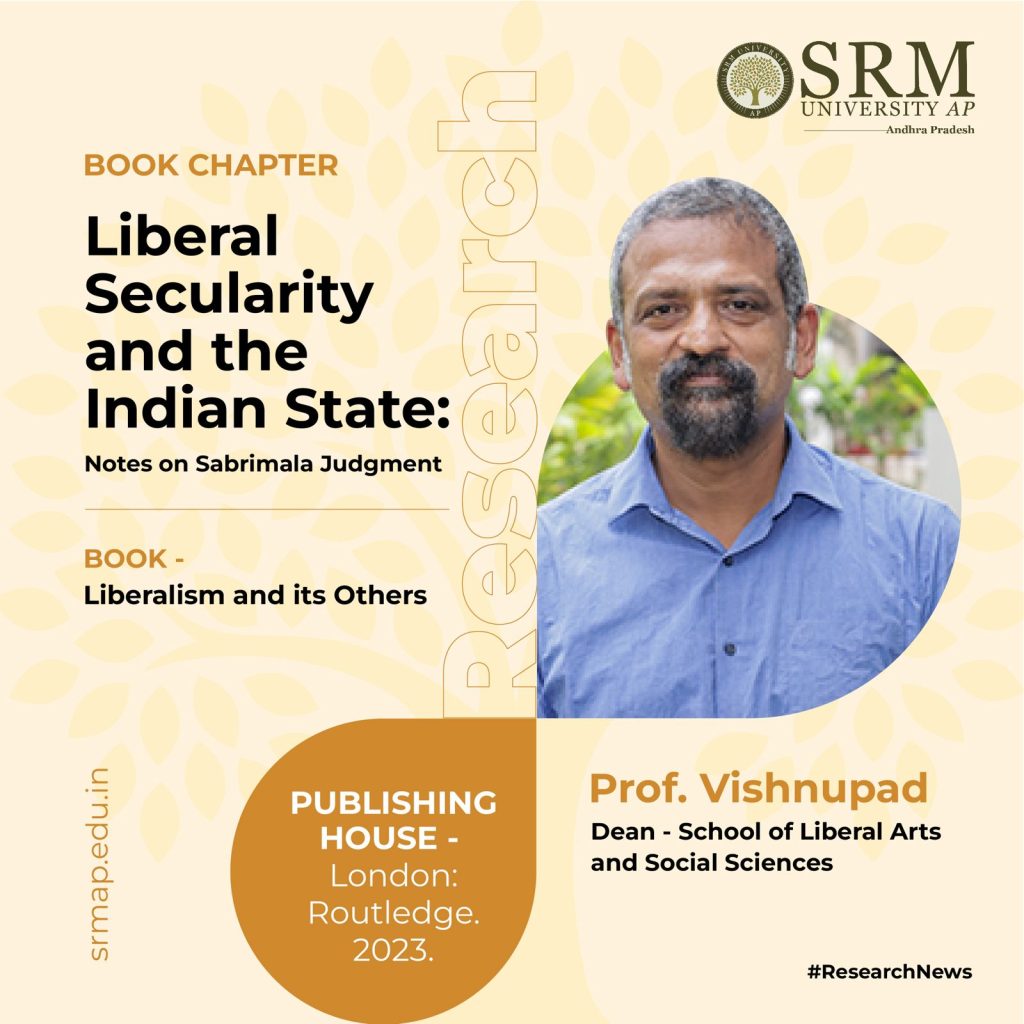
Prof. Vishnupad, Dean – Easwari School of Liberal Arts, has published his latest book chapter, “Liberal Secularity and the Indian State: Notes on the Sabrimala Judgment,” in the prestigious book “Liberalism and its Others”. The intriguing essay explores the complexities of modern secularity in liberal and postcolonial governments and navigates the delicate tango between the political and the religious. The book chapter is a scholarly investigation that maintains the importance of politics over religion while addressing the intricate dynamics of distance to closeness, neutrality to autonomy, and tolerance to publicity. Prof. Vishnupad challenges traditional knowledge, pushing to embrace ethical secularity’s dedication to discourse, transcending political and religious hierarchies.
This stimulating work is a light of intellectual engagement that will affect discussions in the fields of political philosophy, liberalism, and the state’s relationship with religion. Dive deep into these issues as we consider the nexus between politics and faith.
- Published in Departmental News, Liberal Arts News, News, Research News
Innovative Study on Microplastics in Groundwater Published
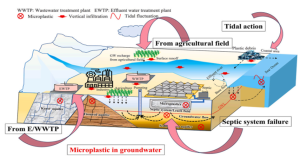 Dr Kousik Das and Dr Deep Raj, Assistant Professors in the Department of Environmental Science and Engineering (EVSE) at SRM University AP, along with Dr Uttiya Dey (Post-doc) and PhD Scholar Mr. Mijanur Mondal, have achieved a significant milestone with the publication of their research paper, “Microplastics in groundwater: An overview of source, distribution, mobility constraints and potential health impacts during the Anthropocene.
Dr Kousik Das and Dr Deep Raj, Assistant Professors in the Department of Environmental Science and Engineering (EVSE) at SRM University AP, along with Dr Uttiya Dey (Post-doc) and PhD Scholar Mr. Mijanur Mondal, have achieved a significant milestone with the publication of their research paper, “Microplastics in groundwater: An overview of source, distribution, mobility constraints and potential health impacts during the Anthropocene.
This pioneering work has been published in the esteemed journal “Groundwater for Sustainable Development,” a Q1 journal with an impressive Impact Factor of 5.9. The paper offers a comprehensive overview of the sources, distribution, mobility constraints, and potential health impacts of microplastics in groundwater, contributing valuable insights to the scientific community.The research team’s dedication to advancing environmental science and addressing crucial issues such as microplastic pollution underscores SRM University AP’s commitment to impactful research and innovation.
Abstract
Microplastics (MPs) are the tiny particles of plastic of > 5 mm in diameter that have already been detected in various environmental matrices like soil, sediment, and surface water, and recently in groundwater also. The occurrence of MPs in groundwater depends up on the transportation through recharge and may controlled by source and local hydrogeology, and partly on the process of surface water-groundwater interaction (SW-GW). Groundwater recharge from agricultural stagnant water, losing streams near dumping sites and agricultural fields, effluents from wastewater treatment plants, septic system failure, etc., are the potential sources of MPs in groundwater. The factors like sea level rise and tidal pumping are among the major factors that may control the migration of MPs in coastal aquifers, along with the physical and chemical properties of the aquifer media. These MPs have another ecological concern as they can adsorb persistent organic pollutants as well as heavy metals and transfer them to animal tissues through the food chain. No such study has been done on the existence, profusion, or environmental factors that contribute to MP pollution in the groundwater in relation to the present climate change scenario. Understanding the extent of MP contamination in groundwater systems is necessary for developing effective management strategies and minimizing their impact on the environment and human health. This study focuses on the source along with the controlling factors of the migration of MPs towards groundwater, including the effect of climate change.
Citation
Dey, U.,Raj, D., Mondal, M., Roy, P., Mukherjee, A., Mondal, N.K. and Das, K. (2023). Microplastics in groundwater: An overview of source, distribution, mobility constraints and potential health impacts during the Anthropocene. Groundwater for Sustainable Development. 23: 101036
Practical implementation and social implications of the research
Microplastic pollution is among the recent emerging pollutants which is still understudied. n. Studies are being conducted mainly focusing the MP contamination in surface water, marine environment and soil, and very limited studies are available to address the source of MPs in groundwater. Even there is lack of standard methods for the effective detection, both qualitatively and quantitatively, of MPs. However, no such study has been done on the existence, profusion, or environmental factors that contribute to MP pollution in the groundwater in relation to the present climate change scenario. As groundwater is a major source of drinking water worldwide, it is of immense importance to enquire more about the source, transport pathways, controlling factors and human health effects of MPs for the safeguard of this valuable resource. Understanding the extent of MP contamination in groundwater systems is necessary for developing effective management strategies and minimizing their impact on the environment and human health. Our study was conducted to mainly focus on the source along with the controlling factors of the migration of MPs towards groundwater including the effect of climate change. The findings of our study would provide valuable insights into the characteristics of MPs in the environment and suggest efforts to mitigate their impact on ecosystems as well as on human health.
Collaborations
The collaborators in this present study are:
- Prof. Abhijit Mukherjee, Department of Geology and Geophysics & School of Environmental Science and Engineering, IIT Kharagpur, West Bengal
- Prof. Naba Kumar Mondal, Department of Environmental Science, The University of Burdwan, West Bengal
Future research plans
Microplastic is one of the recent emerging pollutants which is still understudied. The research has just started to detect MPs in different environmental media as well as to establish effective removal technologies. Our future plans with MP research are as follows:
- To measure the MPs concentration in different coastal areas in India, as the oceans are the major sink for any pollutants, to obtain baseline information about the contamination load
- To detect how much amount of MPs are coming through the major rivers by linking the land use and land cover pattern so that the major sources can be detected
- Detection of MPs in the freshwater aquifer to adopt effective management strategies to safeguard the groundwater
- Development of effective and environment-friendly MP removal technologies
- Published in Departmental News, ENVS News, News, Research News
ICAFA 2023: Fight Against Antimicrobial Resistance
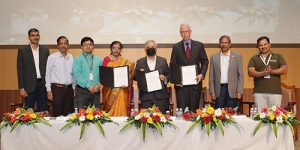 SRM University-AP successfully conducted a two-day International Conclave on Antimicrobial Resistance (ICAFA 2023) in collaboration with AMR Insights from The Netherlands, UK Innovate KTN, Global AMR Hub, Germany, Nitte (Deemed to be University), FABA and ICFAI where esteemed speakers and renowned researchers from across the world came together to address the critical issue of antimicrobial resistance and promote global health awareness.
SRM University-AP successfully conducted a two-day International Conclave on Antimicrobial Resistance (ICAFA 2023) in collaboration with AMR Insights from The Netherlands, UK Innovate KTN, Global AMR Hub, Germany, Nitte (Deemed to be University), FABA and ICFAI where esteemed speakers and renowned researchers from across the world came together to address the critical issue of antimicrobial resistance and promote global health awareness.
ICAFA 2023 acted as a premier platform for experts to share insights, exchange knowledge, and collectively develop actionable strategies to combat the pressing issue. The conclave proved to be a significant milestone in the field of healthcare by providing a common ground for multidisciplinary experts to engage in thought-provoking discussions like ways to make people aware of the right use of antibiotics and control measures to combat it. The event witnessed the presence of leading healthcare professionals, researchers, policymakers, and scientists like Dr Marteen Van Dongen, AMR Insights, Netherlands; Dr Simon Doherty, Queen’s University Belfast, UK; Dr Joanna Wiecek, CSO, CircaGene, UK; Dr Mandy Nevel, Head of Animal Health and Welfare, AHDB, UK; Dr Peter Coombs, LifeArc, UK; Dr Robin Cohen, Innovate UK; Prof. Ranga Reddy Burri, IFCAI, Prof Reddanna, FABD, Prof. Niyas Ahmed, Shanti Swarup Bhatnagar Fellow from the University of Hyderabad, Dr. Nagendra R. Hegde, NIAB and many more who showcased their expertise and shared groundbreaking research and measures in combating AMR. Acknowledging the pressing need for international collaboration and research to combat antimicrobial resistance, SRM University-AP extended its reach through a strategic partnership by signing an MOU with AMR Insights and NITTE (deemed to be the University).
In addition to the esteemed keynote address, an interactive panel discussion and press conference were organized, covering various aspects of antimicrobial resistance. The conference served as a platform for experts to make people aware of the emergence of drug-resistant infections, challenges in the reckless use of antibiotics, and innovative approaches to infection control because of the adverse effects.
Besides the main conference event on Thursday, three roundtables with themes on One Health, Therapeutics and Vaccines, and Diagnostics and Therapeutics were held, during which UK experts, Indian AMR researchers, experts from industry and startups, and representatives from the state medical colleges, AP government departments – health, animal husbandry, and Fisheries, discussed on the possibilities of UK- India collaboration efforts to combat AMR pathogens.
Concluding the International Conclave on Antimicrobial Resistance, dignitaries from SRM University-AP and other esteemed institutions released “10 Mantras to Combat Antimicrobial Resistant Microorganisms” These guidelines encapsulate the collective wisdom and recommendations of the experts present at ICAFA 2023, serving as a guiding light for healthcare professionals, policymakers, and the public in combating antibiotic resistance.
Prof. Manoj K Arora, Vice Chancellor, SRM University-AP, emphasized the institution’s commitment to addressing global health challenges and fostering interdisciplinary collaborations. Antimicrobial resistance is a complex issue that requires collective action. By hosting ICAFA 2023, SRM University AP aims to create a platform for fruitful discussions, research collaborations, and policy recommendations to combat this global health crisis.
Prof. Jayaseelan Murugaiyan, Associate Dean i/c (Sciences) SEAS and Head of the Biological Sciences Department, expressed his gratitude towards the participants and speakers for their contributions to this remarkable event. He stated, “ICAFA 2023 has provided us with a robust platform to collaborate, exchange ideas, and collectively address the challenges of antimicrobial resistance. We are confident that the knowledge shared and the strategies proposed during this conclave will pave the way for a healthier future.”
SRM University-AP’s successful organization of ICAFA 2023 demonstrates its commitment to fostering collaborative efforts in addressing global health challenges. By bringing together international experts and promoting public awareness, the university reiterates its dedication to advancing healthcare and finding tangible solutions to combat antimicrobial resistance.
- Published in Biology News, Departmental News, News, Research News


